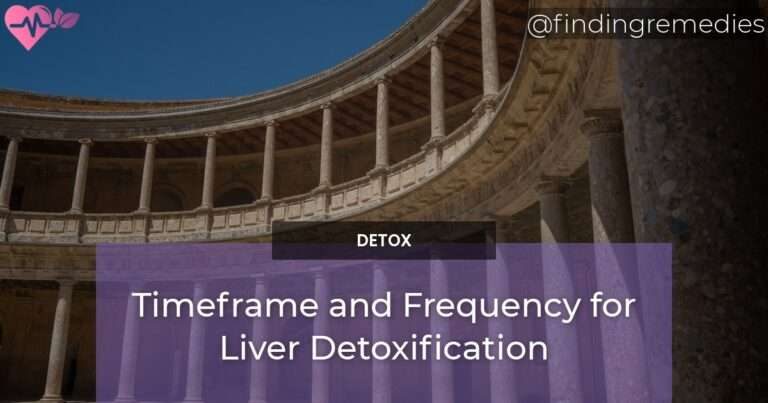If you’re looking for ways to improve your overall health, a liver detoxification may be the answer. A liver detox is an important part of a healthy lifestyle, as the liver is responsible for flushing out toxins and other waste products from the body. A liver cleanse can help improve your digestion, help with weight loss and improve your overall energy levels. But how often should you be scheduling a liver cleanse, and how long should it last?
In this article, we’ll be exploring the timeframe and frequency for liver detoxification, and how you can fit it into your lifestyle. We’ll discuss the benefits of a regular liver cleanse and the potential risks, so you can make an informed decision on how often to schedule a liver detox.
Table of Contents
Liver Function
The liver is the largest internal organ in the body and has over 500 vital functions. One of its primary functions is to filter toxins from the bloodstream and convert them into waste products that are eliminated from the body. The liver also produces bile, which aids in digestion and absorbs fats and fat-soluble vitamins.
Signs of Liver Toxicity
If the liver is overloaded with toxins and unable to eliminate them efficiently, it can lead to liver toxicity. Some of the signs of liver toxicity include fatigue, abdominal pain, yellowing of the skin and eyes, dark urine, and pale stools. To prevent liver toxicity, it is essential to avoid or limit exposure to toxins such as alcohol, tobacco, and harmful chemicals.
Benefits of Liver Detoxification
Liver detoxification can improve overall health by reducing the workload on the liver and promoting optimal liver function. It can also boost immunity, improve digestion, and increase energy levels. Detoxifying the liver has been shown to reduce the risk of liver disease and other chronic illnesses such as cardiovascular disease and diabetes.
ALSO READ
Timeframe for Liver Detoxification
The timeframe for liver detoxification depends on several factors such as the degree of liver toxicity, the detoxification methods used, and the individual’s overall health. Generally, liver detoxification can take anywhere between one week to several months. It is important to note that detoxification is a gradual process, and immediate results cannot be expected.
Frequency of Liver Detoxification
The frequency of liver detoxification depends on several factors such as the individual’s lifestyle and exposure to toxins. For individuals with a healthy lifestyle and minimal exposure to toxins, detoxifying the liver once or twice a year may be sufficient. However, for those with a history of toxin exposure or an unhealthy lifestyle, more frequent detoxification may be necessary.
Detoxification Methods
There are several effective methods of liver detoxification, including:
– Herbal Supplements: Milk thistle, dandelion root, and turmeric are some herbs that are effective in supporting liver function and detoxification.
– Liver cleanses: A liver cleanse involves following a specific diet or a combination of supplements and diet to promote liver detoxification.
– Colon Cleanses: Colon cleanses can help eliminate toxins from the digestive tract, which can lighten the load on the liver.
– Acupuncture: Acupuncture can stimulate the liver and promote natural liver detoxification.
Dietary Modifications
Dietary modifications can aid in liver detoxification. Some foods that support liver function and detoxification include:
– Leafy Greens: Leafy greens such as kale, spinach, and arugula contain chlorophyll, which promotes liver function.
– Citrus Fruits: Citrus fruits such as lemon and grapefruit are rich in antioxidants and promote liver detoxification.
– Berries: Berries such as blueberries, raspberries, and strawberries are rich in antioxidants that support liver function and detoxification.
– Cruciferous Vegetables: Cruciferous vegetables such as broccoli, cauliflower, and Brussels sprouts contain compounds that promote liver detoxification.
Exercise and Hydration
Exercise and hydration can assist in the liver detoxification process. Regular exercise promotes blood flow and lymphatic drainage, which can aid in the elimination of toxins. Adequate hydration helps flush out toxins from the body and promotes optimal liver function.
Consultation with a Healthcare Professional
Individuals with a history of liver disease or those considering a liver detoxification plan should consult a healthcare professional. A healthcare professional can advise on the appropriate detoxification plan and recommend appropriate supplements and lifestyle modifications.
Conclusion
In conclusion, understanding the timeframe and frequency for liver detoxification is important for maintaining optimal liver health and overall well-being. A combination of lifestyle modifications, dietary modifications, and detoxification methods can aid in the liver detoxification process and promote optimal liver function.
RELATED ARTICLES:

